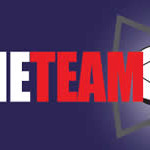Homecoming for “The Team”: Popular international drama airs in USA
By Katherine Seaton
“The Team” has aired in 17 other countries. So why are we bringing it home to the U.S.A.?
At Search for Common Ground, my focus is on projects that find common ground between people who identify themselves differently: republican or democrat, male or female, gay or straight, black or white. While conflict may get described along these lines, these descriptions fall short of people’s experiences. Especially for younger generations, differences are not a one-or-the-other phenomenon; they are a one-of-many issue. The United States of America is becoming more diverse than it has ever been before yet some studies say that we are more racially segregated today than we were during colonial times.[1] [2] Immigration is becoming a hot-button issue once again; we now have new words to describe the LGBTQ community; and new political parties are popping up that stray beyond the republican and democrat divide. As these differences become more visible and complex in our society, today’s youth are exploring and embracing the intricacies of their identities.
 As these complexities arise, many young people are at a loss as to how to approach differences in themselves or in others and it often exacerbates bullying. According to the U.S. Department of Health & Human Services, teenage bullying affects 20% of students in grades 9–12.[3] A 2009 survey conducted by stopbullying.gov found that of more than 7,000 LGBT students aged 13–21 years found that eight of ten students had been verbally harassed at school because of their sexual orientation.[4] Bullying is a growing issue that stems from stereotypes and is fueled by social media.
As these complexities arise, many young people are at a loss as to how to approach differences in themselves or in others and it often exacerbates bullying. According to the U.S. Department of Health & Human Services, teenage bullying affects 20% of students in grades 9–12.[3] A 2009 survey conducted by stopbullying.gov found that of more than 7,000 LGBT students aged 13–21 years found that eight of ten students had been verbally harassed at school because of their sexual orientation.[4] Bullying is a growing issue that stems from stereotypes and is fueled by social media.
Social media creates a transparent world where differences are highlighted and perception is reality. Seeing an online profile has more weight to a teenager than passing a classmate in the hallway. Young people are engaging with each other through social media without actually having a face to face conversation, strengthening misunderstanding and escalating reactions. If youth fail to talk about their issues, we will have an entire generation that doesn’t know how to resolve conflict without violence. It takes an entirely different and new skill set to squash conflict and focus on commonalities. But finding common ground does not come easily, especially when differences are broadcast on a profile, or in a picture for the world to see. It takes a new and creative approach, one that will reach young people the way they understand themselves and others, to change the way youth perceive and react to differences.
With the right resources, we can help end violence in hallways or on the internet and help youth understand their differences in more constructive ways. This is why Search has decided to produce a TV show called The Team DC, which will help youth talk about their different identities in healthy ways while using a medium that they are extremely comfortable with. We will broadcast the show as a web series and take input from youth across the United States to help develop characters in the series and discuss the issues they face to make it as interactive and relevant as possible. Through a web series format, young people will be able to watch the show whenever and wherever they want and immediately post their thoughts and experiences with the different issues on social media sites. Using this creative and relevant method to reach young people, we hope to stir up a new conversation, focused on mutual respect and understanding for one another.
Click below, to learn more about about the project.
_________________________
Katherine Seaton is a Program Associate for Search for Common Ground USA. A graduate of American University in Washington, DC, she majored in International Communication but has changed her focus for the time being to work on issues affecting the United States of America.










